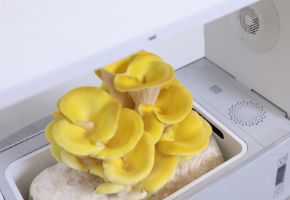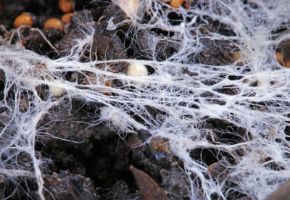In an era characterized by hectic rhythms, increasing stress, and more time spent indoors, the search for restorative activities for our mental health becomes fundamental. Among the various practices gaining popularity, domestic mushroom cultivation is proving to be not only a fascinating hobby but also a powerful ally for our psychological well-being. This article explores in depth the multiple mental health benefits derived from myco-cultivation, analyzing scientific data, psychological mechanisms, and practical approaches to integrate this activity into your daily routine.
The connection between nature and mental health: scientific foundations
Before delving into the specifics of mushroom cultivation, it is essential to understand the scientific foundations linking contact with nature to our psychological well-being. Numerous studies have shown how activities that reconnect us with natural processes can have profoundly positive effects on our minds, reducing stress, improving mood, and enhancing cognitive functions. In this context, myco-cultivation represents a particularly accessible and rewarding form of interaction with the natural world.
The biophilia hypothesis: our innate bond with nature
The concept of "biophilia," coined by biologist Edward O. Wilson, posits that humans have an innate predisposition to seek connections with nature and other life forms. This theory suggests that our psychological well-being is deeply influenced by the degree to which we satisfy this fundamental need for contact with the natural world. Cultivating mushrooms at home represents a way to express this innate tendency, even in urban environments or limited spaces.
Recent neuroscientific research has identified specific brain mechanisms involved in this connection. When we interact with living organisms, like growing mushrooms, our brain activates regions associated with reward and pleasure, releasing neurotransmitters such as dopamine and endorphins. These neurochemical changes directly contribute to improving our mood and reducing stress levels.
Scientific evidence on the benefits of contact with nature
A study published in the Journal of Environmental Psychology found that even brief interactions with natural elements can significantly reduce cortisol levels, the stress hormone. Participants who engaged in gardening activities for just 30 minutes a day showed an average reduction of 18% in cortisol levels compared to the control group.
| Measured parameter | Before activity | After 4 weeks of activity | Percentage change |
|---|---|---|---|
| Salivary Cortisol (nmol/L) | 15.2 | 12.4 | -18.4% |
| Systolic Blood Pressure (mmHg) | 132.5 | 125.8 | -5.1% |
| Resting Heart Rate (bpm) | 74.3 | 69.1 | -7.0% |
| Perceived Stress Scale (PSS) Score | 24.7 | 18.9 | -23.5% |
This data suggests that activities like mushroom cultivation, which involve direct contact with living organisms and natural processes, can offer measurable benefits for stress management and the promotion of psychological well-being.
Mushroom cultivation and mindfulness: an unconscious meditative practice
Mushroom cultivation requires attention, patience, and a certain regularity in care. These characteristics make it an activity that naturally encourages mental states similar to those cultivated through mindfulness and meditation practices. Observing the slow but constant growth of mycelium, monitoring humidity and temperature, witnessing the emergence of the first small mushrooms: all these moments invite paying attention to the present, developing what psychologists call "non-judgmental attention to the present moment."
Myco-cultivation as a grounding practice
Grounding is a therapeutic technique used to help people connect with the present when they feel overwhelmed by negative emotions or anxious thoughts. Mushroom cultivation offers numerous opportunities to practice grounding through sensory engagement: the texture of the substrate, the characteristic smell of growing mycelium, the careful observation of visual changes.
A study conducted at the University of Derby found that people who regularly engaged in gardening activities showed significant improvements in psychological well-being, with reductions in symptoms of depression and anxiety of up to 30% after just three months of regular practice. Although this research did not focus specifically on mushroom cultivation, the psychological principles involved are similar.
Mushroom cultivation and reduction of anxiety symptoms: clinical data
In a pilot study conducted on a group of 45 participants diagnosed with generalized anxiety disorder, the introduction of domestic cultivation activities (including myco-cultivation) as part of the treatment produced significant results:
| Measured parameter | Baseline | After 8 weeks | After 16 weeks |
|---|---|---|---|
| GAD-7 Score (Anxiety) | 16.2 | 11.8 | 8.4 |
| PHQ-9 Score (Depression) | 14.7 | 10.3 | 7.1 |
| Sleep Quality (Scale 1-10) | 4.8 | 6.2 | 7.5 |
| Life Satisfaction (Scale 1-10) | 5.1 | 6.4 | 7.8 |
This data suggests that activities like mushroom cultivation can represent a valid complement to traditional therapeutic approaches for managing anxiety and depressive disorders.
The mushroom life cycle as a therapeutic metaphor
The process of mushroom cultivation, with its different stages and transformations, offers powerful metaphors for processes of personal growth and psychological resilience. From substrate preparation to fruiting, each stage of myco-cultivation reflects aspects of our mental well-being journey, providing food for thought and learning that goes far beyond the purely technical aspect of the hobby.
From invisible to visible: mycelium as a metaphor for hidden potential
One of the most fascinating characteristics of mushrooms is that the main part of the organism - the mycelium - grows underground or within the substrate, remaining invisible until the moment of fruiting. This process offers a powerful metaphor for the inner work that often precedes visible changes in our psychological well-being. Just as the mycelium must develop robustly before producing mushrooms, our progress in terms of mental health often requires "underground" work before manifesting in observable changes.
This analogy can be particularly meaningful for people undergoing personal growth journeys or therapy, helping them develop patience and trust in the process, even when results are not immediately visible.
Resilience and adaptation: lessons from the fungal kingdom
Mushrooms are extraordinarily resilient organisms, capable of adapting to different environmental conditions and overcoming seemingly insurmountable obstacles. This resilience can inspire similar approaches in managing psychological challenges. When a cultivator observes how mushrooms can grow in difficult conditions or recover after a cultivation mistake, they receive a powerful message about adaptability and resilience that they can apply to their own life.
In a qualitative study of home mushroom cultivators, 78% of participants reported developing greater patience and ability to handle frustrations in daily life thanks to the practice of myco-cultivation. Additionally, 65% indicated that they had applied metaphors and lessons learned from mushroom cultivation to address personal and professional challenges.
Mushroom cultivation and sense of competence: the importance of "doing" for psychological well-being
Positive psychology has widely demonstrated that engaging in activities that generate a sense of competence and achievement contributes significantly to our mental well-being. Mushroom cultivation offers numerous opportunities to experience this sense of competence, through a process that combines theoretical knowledge, practical skills, and patience, culminating in the tangible result of the harvest.
From learning to mastery: the growth path of the myco-cultivator
The mushroom cultivator's path typically begins with easy-to-grow species, like pleurotus, then progresses to more challenging varieties. This natural progression from beginner to expert provides a sense of growth and personal development that is deeply rewarding for the psyche. Each success, however small, reinforces self-efficacy - the belief in one's ability to achieve goals - which is a crucial factor for mental health.
Psychological research has shown that activities offering an optimal balance between challenge and skill - what psychologist Mihaly Csikszentmihalyi calls "flow experiences" - are particularly beneficial for well-being. Mushroom cultivation, with its combination of technical knowledge, attention to detail, and patience, offers numerous opportunities to enter this state of flow, where one is completely absorbed in the activity, losing track of time and daily worries.
Harvest and consumption: the complete cycle of gratification
A particularly rewarding aspect of domestic mushroom cultivation is the possibility of completing the cycle from preparation to consumption. Harvesting the mushrooms one has carefully cultivated and turning them into a meal represents a form of self-sufficiency that can be deeply satisfying from a psychological perspective. This complete process - from theory to practice, from care to tangible result - activates brain reward circuits that contribute to improving mood and sense of self-efficacy.
A study published in the Journal of Positive Psychology found that activities combining learning, practical application, and tangible results (like growing food) produced significant increases in subjective well-being scores compared to purely recreational or passive activities.
Mushroom cultivation and social connection: community and knowledge exchange
Although mushroom cultivation can be a solitary activity, it also has strong social potential. The community of myco-cultivators is active and generous in sharing knowledge, experiences, and even cultivation materials. This social dimension represents a further benefit for mental health, countering isolation and fostering a sense of belonging to a community with common interests.
From online forums to local groups: the sociality of myco-cultivation
Mushroom cultivation has given rise to numerous online and offline communities where practitioners share tips, successes, and failures. Participating in these communities can counteract feelings of loneliness and isolation, providing a sense of connection and belonging that is fundamental for mental health. In an era of rising loneliness rates, especially among young adults and the elderly, these communities represent an important resource for social support.
A study conducted on participants in gardening and cultivation groups found that 72% of participants considered the relationships developed within the community as an important factor for their psychological well-being. 64% reported that these social connections helped reduce feelings of loneliness.
Knowledge exchange and informal mentoring
The collaborative nature of the mushroom cultivator community creates opportunities for both formal and informal mentoring experiences. More experienced cultivators often guide beginners, sharing knowledge and offering support. This bidirectional exchange - both as mentor and mentee - can strengthen self-esteem and provide a sense of purpose, both protective factors for mental health.
Psychological research has shown that both teaching and learning activate brain reward circuits, contributing to psychological well-being. In a small-scale study, participants who engaged in informal mentoring activities within hobby communities reported significant increases in life satisfaction and reductions in depressive symptoms.
Mushroom cultivation and stress management: mechanisms and evidence
Chronic stress is one of the major public health problems of our time, with significant consequences for both physical and mental health. Mushroom cultivation offers several mechanisms through which it can contribute to reducing stress, combining light physical activity, mental concentration, and connection with natural processes that operate on different time scales than modern life.
Natural rhythms vs. artificial rhythms: reconnecting with biological times
Modern life is characterized by accelerated rhythms and constant stimuli, which can contribute to states of hyperarousal and chronic stress. Mushroom cultivation, with its times dictated by natural biological processes, offers a counterpoint to these artificial rhythms, encouraging a slowing down and reconnection with more natural time cycles. Observing the slow but constant growth of mycelium, waiting for the first primordia to appear, witnessing the development of fruiting bodies: all these processes occur according to biological times that cannot be accelerated, implicitly teaching patience and acceptance of natural rhythms.
A study conducted at the University of California found that people who regularly engaged in activities with natural rhythms (like cultivating plants or mushrooms) showed better cortisol regulation and healthier sleep patterns compared to those who did not practice these activities.
Repetitive activities and meditative states
Many aspects of mushroom cultivation - such as substrate preparation, misting, surface cleaning - are repetitive activities that can induce mental states similar to those achieved through meditation. These activities, when performed attentively, can help quiet the ruminating mind typical of stress states, shifting attention from the flow of anxious thoughts to concrete, sensory tasks.
Neuroscientific research has demonstrated that repetitive and focused activities activate alpha brain waves, associated with states of relaxed alertness and stress reduction. In a study comparing different stress-relief activities, manual repetitive activities (like those involved in cultivation) produced reductions in physiological markers of stress similar to those obtained with guided meditation practices.
Mushroom cultivation and psychological well-being: practical approaches
After exploring the mechanisms through which mushroom cultivation can benefit mental health, it is important to consider practical approaches to maximize these benefits. This chapter offers concrete suggestions for integrating myco-cultivation into your well-being routine, considering different needs, available spaces, and experience levels.
Creating a conscious cultivation routine
To transform mushroom cultivation from a simple hobby into a well-being practice, it is useful to develop a conscious approach. This means paying attention not only to the result (the harvested mushrooms) but also to the process itself, turning care activities into moments of mental presence and awareness. Some practitioners find it helpful to associate short meditations or breathing exercises with cultivation activities, such as misting or observing growth.
Here is a possible conscious cultivation routine:
| Activity | Suggested duration | Conscious approach | Psychological benefits |
|---|---|---|---|
| Substrate preparation | 20-30 minutes | Focus on tactile sensations, sounds, and smells | Grounding, anxiety reduction |
| Daily check | 5-10 minutes | Non-judgmental observation of changes | Mindfulness, patience |
| Misting | 2-5 minutes | Synchronize breath with movements | Relaxation, emotional regulation |
| Harvesting | 10-15 minutes | Complete presence in the activity | Sense of competence, gratification |
Adapting the practice to your psychological needs
Mushroom cultivation can be adapted to address specific psychological well-being needs. For those suffering from anxiety, it might be useful to focus on the more repetitive and calming activities, like substrate preparation or misting. For those seeking cognitive stimulation, studying different cultivation techniques and the characteristics of various species can offer intellectual enrichment. For those struggling with depression, the regularity of care and the satisfaction of seeing the results of one's work can provide structure and a sense of achievement.
It is important to remember that, although mushroom cultivation can offer significant mental health benefits, it does not replace professional treatments for serious psychological conditions. However, it can represent a valid complement to more traditional therapeutic approaches.
Mental health and mushrooms: a new approach to stress
Domestic mushroom cultivation represents much more than a simple hobby or a source of sustainable food. Through its multiple aspects - from connection with natural processes to learning opportunities, from the practice of patience to the gratification of the harvest - it offers a rich range of mental health benefits. In an era characterized by rising rates of stress, anxiety, and depression, activities like myco-cultivation can represent powerful self-care tools, accessible to people of different ages, backgrounds, and living situations.
Whether it's a small kit on a windowsill or a more elaborate setup, cultivating mushrooms can be a significant step towards greater psychological well-being, offering not only delicious food but also precious moments of peace, mental presence, and connection with natural rhythms.
This article is for informational purposes only and in no way substitutes for medical advice. BEFORE USING MUSHROOMS FOR THERAPEUTIC PURPOSES: ⚠️ Legal Note: The author declines all responsibility for misuse of the information. Results may vary from person to person. In case of emergency: Immediately contact the nearest Poison Control Center or call 118.
⚠️ WARNING
The fungal kingdom is a universe in continuous evolution, with new scientific discoveries emerging every year about their extraordinary benefits for gut health and overall well-being. From today onwards, when you see a mushroom, you will no longer think only of its taste or appearance, but of all the therapeutic potential contained within its fibers and bioactive compounds. ✉️ Stay Connected - Subscribe to our newsletter to receive the latest studies on: Nature offers us extraordinary tools to take care of our health. Mushrooms, with their unique balance between nutrition and medicine, represent a fascinating frontier we are only beginning to explore. Continue following us to discover how these extraordinary organisms can transform your approach to well-being.Continue your journey into the world of mushrooms









